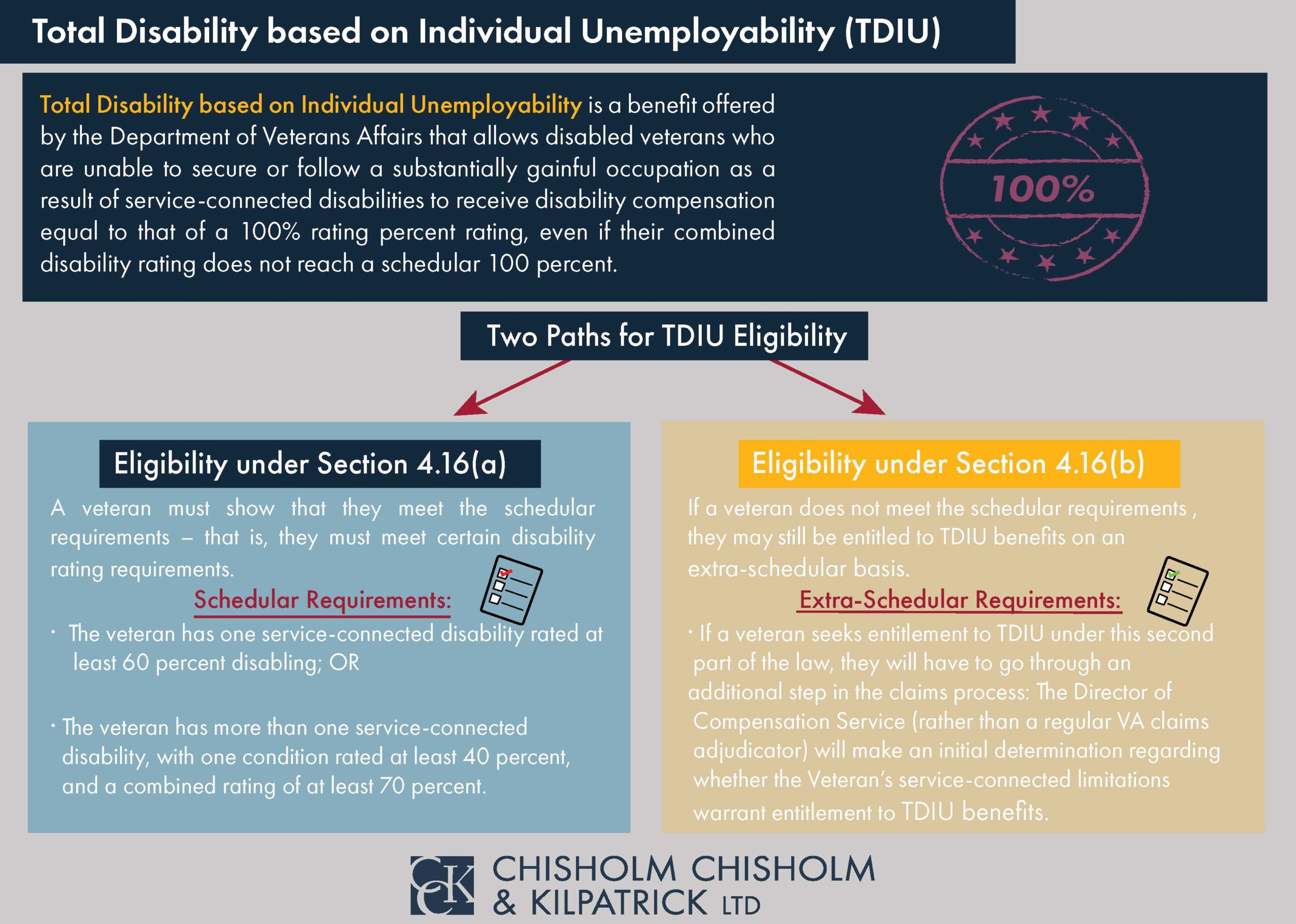What is Extraschedular Individual Unemployability (TDIU) from VA?

CCK Law: Our Vital Role in Veterans Law
What is Individual Unemployability (TDIU)?
Individual unemployability (TDIU) is a disability benefit that allows for veterans to be compensated at VA’s 100% disability rate, even if their combined disability rating does not equal 100%. TDIU is awarded in circumstances in which veterans are unable to secure or follow substantially gainful employment due to their service-connected conditions. TDIU can provide a substantial financial benefit for those whose schedular ratings do not combine to 100%. For example, there is currently about a $1,200 compensation gap between a 90% rating and a 100% rating.
Eligibility Requirements for Individual Unemployability
VA outlines TDIU requirements under 38 CFR § 4.16, which encompasses subsections (a) and (b). Each subsection describes a different path by which veterans may meet the requirements for TDIU. In order to qualify for TDIU under 38 CFR § 4.16(a), a veteran must have:
- One service-connected condition rated at 60% or higher; or
- Two or more service-connected conditions, one of which is rated at least 40% disabling, with a combined disability rating of at least 70%.
Importantly, if a veteran has multiple service-connected conditions, there are five ways the conditions can be combined to reach the qualifying 60% or 40% for TDIU benefits. Under 38 CFR § 4.16(a), the following circumstances can be combined and considered as one disability for the purposes of TDIU:
- If a veteran has a disability of one or both of their upper extremities, or one or both of their lower extremities, those disabilities can be combined into one rating in order to reach the aforementioned 60% or 40% rating to qualify for TDIU.
- If a veteran’s disabilities stem from “common etiology or a single accident.” For example, multiple disabilities incurred from a single explosion during service can be combined into one rating.
- Disabilities that affect a single body system (e.g., multiple service-connected disabilities impacting the respiratory system) can be combined into one rating.
- If a veteran incurred a number of injuries in action, those injuries can be combined into a single rating.
- Former prisoners of war incurred multiple disabilities during their time in captivity may combine those disabilities into one rating.
Those who do not meet the schedular requirements under § 4.16(a) may still be considered for TDIU under § 4.16(b): extraschedular TDIU.
Overview of Extraschedular Disability Ratings
An extraschedular disability rating is one that grants veterans a higher rating than the one they would receive based on the standard rating schedule used by VA. Therefore, if the rating schedule does not adequately reflect the severity of a veteran’s condition, they can argue for an extraschedular rating.
VA regulation 38 CFR § 3.321(b)(1) lists the criteria veterans must meet for VA to consider granting an extraschedular disability rating. First, veterans must display an “exceptional or unusual disability picture with such related factors as marked interference with employment or frequent periods of hospitalization as to render impractical the application of regular [schedular standards.” This means that the veteran’s condition must be so unique that the standard disability rating schedule does not adequately or accurately reflect the degree to which the disability limits their functional capacity.
It is important to note that the extraschedular process is slightly different when it comes to individual unemployability benefits.
How Do Veterans Receive Extraschedular TDIU?
Again, extraschedular ratings operate differently than extraschedular TDIU. Here, the focus remains on whether the veteran’s service-connected conditions preclude employment as opposed to what the rating is for the underlying service-connected conditions rated. Extraschedular TDIU is established under 38 CFR § 4.16(b) and exists for veterans who are unable to secure and follow substantially gainful employment due to service-connected conditions, but who fail to meet the rating percentages set forth in § 4.16(a). Under subsection § 4.16(b), VA should refer the veteran’s claim for TDIU to the Director of Compensation Service for extraschedular consideration.
The Director will then review how factors such as the veteran’s service-connected conditions, employment history, educational and vocational attainment have bearing on the issue at hand. Essentially, extraschedular TDIU is a catch-all provision that allows consideration of a veteran’s claim even when the usual requirements of § 4.16(a) are not met. According to Bowling v. Principi (2001), a veteran can be rated 100% disabled under both a TDIU or extraschedular TDIU theory. However, this does not guarantee that either the Director or the VA adjudicators will approve veterans’ TDIU claims on an extraschedular basis.
Appealing Denials of Extraschedular TDIU
If your claim for extraschedular TDIU was denied, you have the right to appeal. It may be beneficial to consult a representative, such as a veterans lawyer, veterans claims advocate, or Veterans Service Organization (VSO).
About the Author
Share this Post

